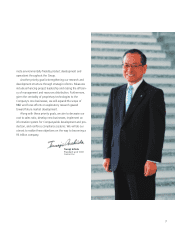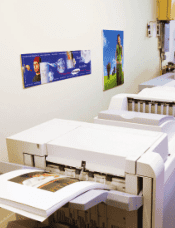Canon 2007 Annual Report Download - page 19
Download and view the complete annual report
Please find page 19 of the 2007 Canon annual report below. You can navigate through the pages in the report by either clicking on the pages listed below, or by using the keyword search tool below to find specific information within the annual report.
17
Basic Policy and Corporate Governance Structure
Canon recognizes that strengthening management supervision
functions and maintaining management transparency are vital to
improving its corporate governance structure and raising corporate
value. Canon’s basic governance structure comprises the General
Meeting of Stockholders, the Board of Directors and the Board of
Corporate Auditors. Furthermore, the Executive Committee and
management committees are dedicated to key issues. All of these
bodies work together to ensure appropriate management of the
Group through an independent internal auditing structure centered
on the Corporate Audit Center, and an information disclosure
system for management activities.
Board of Directors
Important business matters are discussed and ratified during meet-
ings of the Board of Directors and Executive Committee, which are
attended, in principle, by all directors. As of December 31, 2007, the
Board consisted of 27 directors. In order to realize a more stream-
lined and efficient management decision-making process, Canon
has not adopted an outside director system. The main reason why
directors are chosen from among Canon personnel is that they have
followed these same codes of behavior and have been subject to
close scrutiny within the Group over many years.
Auditing System
The Company has five corporate auditors, including three external
auditors who have no personal, capital or business affiliations with
Canon. Auditors’ duties include attending meetings of the Board of
Directors, Executive Committee and various management commit-
tees, listening to business reports from directors, carefully examining
documents related to important decisions, and conducting strict
audits of the Group’s business and assets. Corporate auditors also
work closely with accounting auditors and the Corporate Audit
Center, which monitors compliance, risk management and internal
control systems, and provides assessments and recommendations.
Internal Control Committee
The Internal Control Committee, established in 2004, ensures the
reliability of financial reporting. It also conducts reviews of the
Group’s internal controls in order to gauge the true efficiency of
business operations, supports compliance with all related laws and
internal regulations, and implements sound internal controls. In
response to the Sarbanes-Oxley Act, including Section 404 that
came into force during 2006, Canon continues to reinforce internal
control systems and implement all appropriate measures.
In order to strengthen internal controls, Canon conducts com-
prehensive evaluations of internal controls across areas including
accounting, management oversight, legal compliance, IT systems,
and promotion of corporate ethics.
Internal controls over financial reporting as of December 31, 2007,
have been assessed as effective by the management and the independ-
ent registered public accounting firm. (Please refer to p.95 and p.97)
Other Corporate Governance Committees
Canon’s management committees are integral to its overall gover-
nance system. Key among these are the Corporate Ethics and
Compliance Committee, which discusses and approves compliance
and corporate ethics policies; the Global Legal Affairs Coordination
Committee, which analyzes trends in legal developments and
works to raise the level of employee awareness regarding impor-
tant legal issues facing the Group; and the Disclosure Committee,
which is dedicated to ensuring the dissemination of accurate and
thorough information.
Compliance
Since its founding, employee education has been based on the
guiding principles of the San-Ji, or “Three Selfs” spirit, namely “self-
motivation,” or taking the initiative and being proactive in all things;
“self-management,” or conducting oneself responsibly and being
accountable for all one’s actions; and “self-awareness,” or under-
standing one’s situation and role in it. Based upon these principles,
Canon compliance cards
























